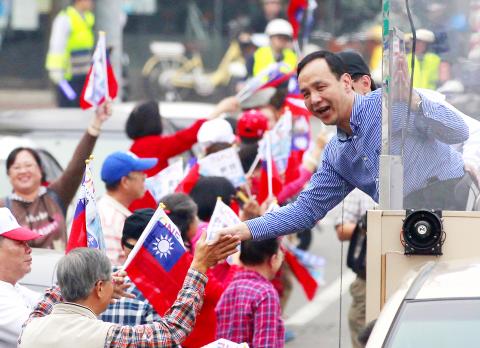Chinese Nationalist Party (KMT) presidential candidate Eric Chu (朱立倫) yesterday urged the Chinese and Hong Kong governments to make an unequivocal statement over the reported disappearances of several people working for a Hong Kong publishing house and a related bookstore.
“Democracy has become the inevitable trend of all nations. In light of the incidents [of missing people] in Hong Kong, the Hong Kong or Chinese governments must give the public a clear answer,” Chu said during street canvassing in Yunlin County yesterday morning.
Asked whether the missing persons case could set democratic alarm bells ringing in Taiwan, Chu said that the ideals of democracy and freedom are widely held among the international community.

Photo: Reuters
Democracy and freedom are particularly valued by Taiwanese, Chu added.
Chu’s remarks came one day after Hong Kong Chief Executive Leung Chun-ying (梁振英) dismissed allegations that outside agents could have been involved in the disappearance of five booksellers specializing in publications critical of China.
According to the Hong Kong Alliance in Support of Patriotic Democratic Movements in China, five shareholders and employees of Causeway Bay Books — one of the few bookstores in Hong Kong that sells publications banned in China — have gone missing on separate occasions since October last year.
The alliance said it suspects that one of the shareholders, Lee Bo (李波), who disappeared in Hong Kong on Wednesday last week, could have been kidnapped by Chinese law enforcement officials.
On Monday, the Taiwan Solidarity Union (TSU) held a press conference deploring what it said was China’s disrespect for human rights and its deprivation of the right to freedom of expression.
The TSU also expressed concerns that President Ma Ying-jeou’s (馬英九) China-leaning policies could see Taiwan go down the same path as Hong Kong.
Regarding the thorny issue of US pork imports containing ractopamine, Chu said that many consumer groups and pig farms in Yunlin, Pingtung and Chiayi counties have spoken strongly against the idea of lifting the import ban.
“We will surely respect their opinions. Of all the concerns they have brought up, they are most worried about the health impact of relaxing the ban,” Chu said.
Asked whether he agreed that supporting Democratic Progressive Party (DPP) presidential candidate Tsai Ing-wen (蔡英文) is tantamount to supporting imports of ractopamine-laced US pork, Chu said that many pig farmers across the nation are of that opinion.
Chu has interpreted Tsai’s comment that Taiwan should consider Japan’s and South Korea’s standards for ractopamine in imported pork an indication that if elected, she would open up the nation to US pork containing ractopamine residue.

A magnitude 6.4 earthquake struck off the coast of Hualien County in eastern Taiwan at 7pm yesterday, the Central Weather Administration (CWA) said. The epicenter of the temblor was at sea, about 69.9km south of Hualien County Hall, at a depth of 30.9km, it said. There were no immediate reports of damage resulting from the quake. The earthquake’s intensity, which gauges the actual effect of a temblor, was highest in Taitung County’s Changbin Township (長濱), where it measured 5 on Taiwan’s seven-tier intensity scale. The quake also measured an intensity of 4 in Hualien, Nantou, Chiayi, Yunlin, Changhua and Miaoli counties, as well as

Taiwan is to have nine extended holidays next year, led by a nine-day Lunar New Year break, the Cabinet announced yesterday. The nine-day Lunar New Year holiday next year matches the length of this year’s holiday, which featured six extended holidays. The increase in extended holidays is due to the Act on the Implementation of Commemorative and Festival Holidays (紀念日及節日實施條例), which was passed early last month with support from the opposition Chinese Nationalist Party (KMT) and Taiwan People’s Party. Under the new act, the day before Lunar New Year’s Eve is also a national holiday, and Labor Day would no longer be limited

COMMITMENTS: The company had a relatively low renewable ratio at 56 percent and did not have any goal to achieve 100 percent renewable energy, the report said Pegatron Corp ranked the lowest among five major final assembly suppliers in progressing toward Apple Inc’s commitment to be 100 percent carbon neutral by 2030, a Greenpeace East Asia report said yesterday. While Apple has set the goal of using 100 percent renewable energy across its entire business, supply chain and product lifecycle by 2030, carbon emissions from electronics manufacturing are rising globally due to increased energy consumption, it said. Given that carbon emissions from its supply chain accounted for more than half of its total emissions last year, Greenpeace East Asia evaluated the green transition performance of Apple’s five largest final

Taiwan is to extend its visa-waiver program for Philippine passport holders for another year, starting on Aug. 1, Minister of Foreign Affairs Lin Chia-lung (林佳龍) said on Friday. Lin made the announcement during a reception in Taipei marking the 127th anniversary of Philippine independence and the 50th anniversary of the establishment of the Manila Economic and Cultural Office (MECO) in Taiwan, the Ministry of Foreign Affairs said. The decision reflected Taiwan’s commitment to deepening exchanges with the Philippines, the statement cited Lin as saying, adding that it was a key partner under the New Southbound Policy launched in 2016. Lin also expressed hope